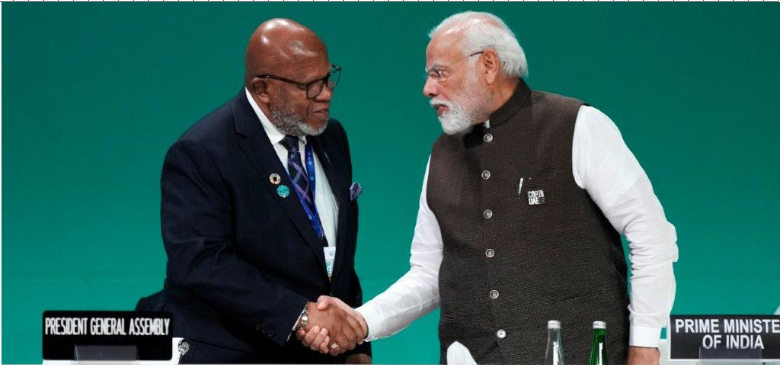Prime Minister Modi calls for climate equity at COP28
COP28 commencing in Dubai on Nov 30. Photo: AP Photo/Peter Dejong
The Indian delegation to the the United Nations Conference of Parties (COP) pledged to redouble efforts moving away from fossil fuels to renewable energy, among many other commitments, led by the Indian Prime Minister Narendra Modi. The conference, the only multilateral decision-making body on climate change, is taking place in Dubai, United Arab Emirates from November 30 to December 12, 2023.
India called for the concept of climate “equity” to be included in future climate action plans. This concept recognizes the unequal burdens of climate change on different countries, while ensuring every country can benefit from the results of collective climate policy.
Prime Minister Modi pledged to redouble efforts to shift the nation away from fossil fuels and accelerate the development of renewable energy by setting targets to bring emission intensity, the volume of emissions per unit of GDP, down by 45% and increase the share of non-fossil fuels to 50% by 2030.
On December 1 at the conference, Modi said “A small section of mankind has exploited nature indiscriminately. But the whole of humanity is paying its price, especially the residents of the Global South.”
“The entire world is watching us,” he said. “Mother Earth is looking toward us to protect her future. We have to succeed.” He went on to praise India for setting an example, saying, “India has presented a model of development to the world, striking a great balance between ecology and economy”
India uses coal to produce 49% of its installed generation capacity of 0.42 million gigawatts. Phasing down coal was a major goal of COP26 in 2021. Though India pledged net-zero emissions by 2070, it did not agree to phase-out coal. India also did not sign a pledge on the sidelines of COP28’s third day to triple renewable energy, signed by 116 countries, even though the the G20 Summit in New Delhi agreed on this declaration during its Indian leadership just two months earlier.
Prime Minister Modi shaking hands with UNGA President Francis on Dec 1. Photo: AP Photo/Peter Dejong
Climate change across the Earth is the reason for increasing heat waves, floods, droughts, landslides and crop failures. To solve this, world leaders got together in 2015 to sign one of the most significant pieces of climate policy in history — the Paris agreement.
This edition of the COP is historic for introducing the first ever Global StockTake (GST), which is a global climate progress report that looks into global environmental commitments and tracks progress. The report found that the world is far away from meeting its Paris Agreement targets, and that countries will need to “chart a better course.”
A report from India's government outlining its approach to the GST calls for developed countries to bear more of the load in helping poorer nations meet and finance agreed-upon climate goals. In absolute terms, India is the third highest emitter of greenhouse gasses worldwide, although in per capita terms, the South Asian nation’s emissions are far lower than those of richer Western economies, like the United States, or Asian peers, such as China.
Many other world leaders, such as the Zambian President Hakainde Hichelima, pledged to increase efforts at advancing solar power and other forms of renewable energy, while arguing for technology transfer and sharing of best practices. Like Modi, other global leaders focussed on coal, a central component of climate efforts and committed to net-zero emissions by 2070.


